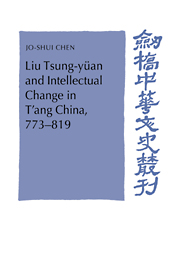Book contents
- Frontmatter
- Contents
- Acknowledgments
- Maps
- Chronology
- Abbreviations
- Introduction
- 1 Literati and thought in the early and middle T'ang
- 2 Liu Tsung-yüan and the circumstances of Ch'ang-an
- 3 805: The abortive reform
- 4 Declaration of principles: Tao and antiquity
- 5 Heaven, the supernatural, and Tao
- 6 Literary theory, canonical studies, and beyond
- 7 Sources of Liu's Confucian thought
- 8 The private sphere
- Conclusion
- Glossary
- Bibliography
- Index
Conclusion
Published online by Cambridge University Press: 07 October 2009
- Frontmatter
- Contents
- Acknowledgments
- Maps
- Chronology
- Abbreviations
- Introduction
- 1 Literati and thought in the early and middle T'ang
- 2 Liu Tsung-yüan and the circumstances of Ch'ang-an
- 3 805: The abortive reform
- 4 Declaration of principles: Tao and antiquity
- 5 Heaven, the supernatural, and Tao
- 6 Literary theory, canonical studies, and beyond
- 7 Sources of Liu's Confucian thought
- 8 The private sphere
- Conclusion
- Glossary
- Bibliography
- Index
Summary
Liu Tsung-yüan died in Liu-chou on the eighth day of the eleventh month (or possibly a month earlier), the fourteenth year of the Yüan-ho era of Emperor Hsien-tsung (819), at the age of forty-six. Even for a T'ang adult, his life was not long. Yet his mind was so rich and sensitive that it reveals to us a good deal not only about the intellectual landscape and changes of his time but also about a more general human condition: how an idealist tries to transcend the cultural milieu and sociopolitical realities in which he finds himself and how such a person struggles with the persistence as well as the frailty of his aspirations.
The focus of this treatise, certainly, has been the examination of the life and thought of Liu in the light of their connections with mid-T'ang intellectual changes. I have paid particular attention to the implications of Liu's ideas and emotions for understanding the nature of the mid-T'ang Confucian revival and the origins of the Neo-Confucian tradition. In other words, this study was carried out in the hope that it could shed light on the general character of a pivotal intellectual transition in Chinese history through the scrutiny of an individual case. The result, I believe, is fruitful, and the following is a summary of my major findings and points of analysis.
- Type
- Chapter
- Information
- Liu Tsung-yüan and Intellectual Change in T'ang China, 773–819 , pp. 188 - 193Publisher: Cambridge University PressPrint publication year: 1992

